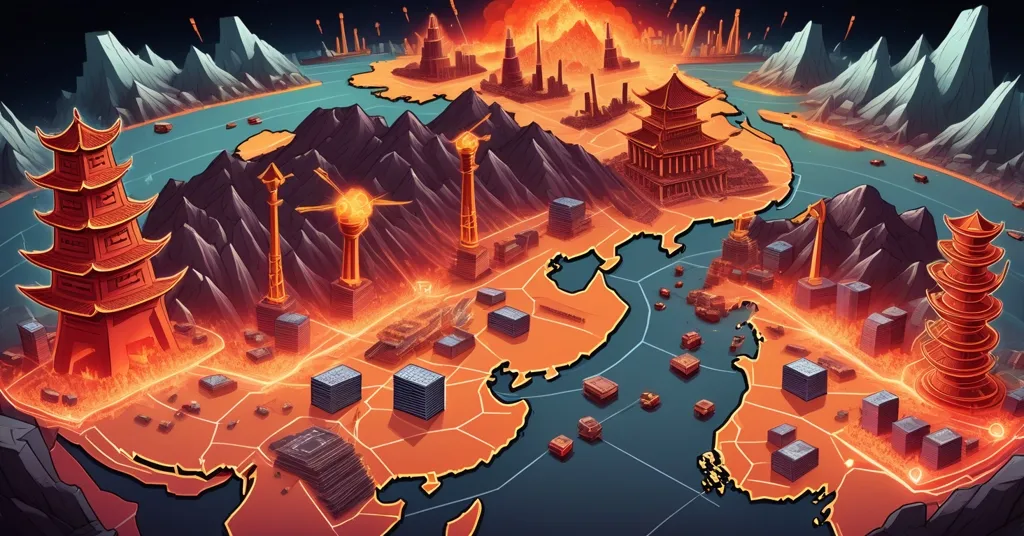Trump’s Asia Tour: Trade Wars Threaten Bitcoin Mining Hardware Crisis

Trump’s Asia Tour: Trade Wars, Rare Earths, and the Crypto Hardware Crisis
President Donald Trump’s latest Asia tour, kicking off with the ASEAN Summit in Malaysia, is more than a diplomatic parade—it’s a high-stakes gamble with direct consequences for Bitcoin mining and blockchain technology. As Trump pushes for trade deals, slaps tariffs, and hunts for rare earth minerals to counter China’s stranglehold, the crypto world watches with bated breath. Will this trip secure the hardware lifeline that decentralized networks desperately need, or will it just escalate a trade war that screws over miners and innovators alike?
- Main Agenda: Trade agreements, tariffs, and securing rare earth minerals amid US-China tensions.
- Crypto Connection: Supply chain disruptions could choke Bitcoin mining hardware and blockchain infrastructure.
- Diplomatic Play: Peace deals and alliances to counter China’s regional dominance.
Trade Wars: A Direct Hit to Crypto Hardware
At the heart of Trump’s Asia visit is a brutal trade war with China that’s got everyone from tech giants to Bitcoin miners sweating bullets. The ASEAN Summit—a key gathering of Southeast Asian leaders to hash out trade and security issues—is Trump’s stage to tackle tariffs and access to rare earth minerals, the lifeblood of modern tech. These 17 obscure elements are critical for manufacturing everything from smartphones to military gear, and yes, the high-powered ASICs (Application-Specific Integrated Circuits) that keep Bitcoin’s network humming. Think of rare earths as the oil of the digital age—without them, your mining rig is just a pricey paperweight.
China controls over 80% of the global rare earth supply, and their threat to restrict exports has Trump countering with a savage 130% tariff on Chinese goods by November 1, up from a mere 30%. Not to be outdone, the US is mulling limits on critical software exports to China, while Beijing has already hit back by halting American soybean purchases—a gut punch to US farmers. For the crypto crowd, this isn’t just political theater. Over 90% of Bitcoin mining hardware relies on components tied to these minerals, and past disruptions like the 2021 chip shortage saw ASIC prices spike by 40%, throttling miners’ ability to scale. If China tightens the screws, we could see mining costs skyrocket or production grind to a halt, threatening the very decentralization Bitcoin stands for.
Trump’s response? Diversify like hell. He’s eyeing trade and critical minerals agreements with Malaysia to reduce US dependence on Chinese supply chains. For the uninitiated, supply chain diversification means not putting all your eggs in one basket—if China cuts off rare earths, having Malaysia as a backup could keep mining rigs rolling off assembly lines. But let’s not pop the champagne yet. These deals are slow to finalize, and a 130% tariff hike might sound like a bold middle finger to Beijing, but who’s really paying? American consumers and crypto miners stuck with pricier gear, that’s who. Economic warfare isn’t a clean fight—it’s a messy brawl with collateral damage.
Rare Earths: Crypto’s Achilles’ Heel
Digging deeper, the rare earth crisis is a glaring vulnerability for the crypto ecosystem. Bitcoin mining isn’t just about code and electricity; it’s a hardware game. ASICs, GPUs for altcoin mining, and even the servers running Ethereum staking nodes all depend on components laced with rare earths like neodymium and dysprosium. China’s near-monopoly means they can hold the entire industry hostage with a single policy shift. Imagine a 51% attack, but instead of hashing power, it’s a supply chain chokehold—same devastating effect on network security and growth.
Trump’s push for Malaysian partnerships is a step toward resilience, and if successful, it could be a lifeline that keeps Bitcoin’s decentralized heartbeat strong. On the flip side, let’s play devil’s advocate: even diversified supply chains are still centralized at the nation-state level. Relying on any government—be it Malaysia or the US—to secure crypto’s hardware contradicts the borderless, trustless ethos of blockchain. Shouldn’t we be pushing for open-source hardware designs or community-driven recycling initiatives instead? Bitcoin maximalists might argue that true decentralization means cutting ties with these geopolitical games altogether, even if it’s a pipe dream in the short term.
Diplomatic Wins and Crypto Implications
Amid the trade war chaos, Trump has scored a diplomatic win that bolsters US influence in Southeast Asia—a region critical for tech supply chains. He brokered a ceasefire between Thailand and Cambodia, building on a preliminary deal from July that was spurred by trade agreement pressures. The terms are concrete: Thailand releases Cambodian detainees, Cambodia pulls back heavy weapons, and regional observers ensure compliance. Cambodian Prime Minister Hun Manet called it historic, while Thai official Anutin Charnvirakul sees it as a foundation for lasting peace. Trump, never shy about claiming credit, put it bluntly:
“We did something that a lot of people said couldn’t be done.”
This isn’t just a feel-good story; it’s strategic. A stable Southeast Asia means smoother trade routes and partnerships, indirectly supporting efforts to diversify tech manufacturing away from China. For crypto, regional stability could mean fewer disruptions in hardware production hubs—many of which are in or near ASEAN nations. But don’t get too cozy; stability is fragile, and one misstep in US-China relations could ripple through the region, jacking up costs for everyone from Bitcoin miners to Solana validators.
Alliances as a Counterweight: Japan and South Korea
Trump’s itinerary also includes stops in Tokyo and Seoul to meet Japan’s new Prime Minister Sanae Takaichi and South Korea’s President. The goal is clear: strengthen economic and security alliances to counter China’s regional clout. Both nations are tech powerhouses, churning out components vital for blockchain infrastructure. Securing tighter trade ties could mean steadier access to semiconductors and other gear, a small but crucial win for miners and node operators.
However, let’s not ignore the elephant in the room—higher tariffs and trade spats could backfire, raising costs across the board. A pricier GPU doesn’t just hurt gamers; it stings altcoin miners and smaller blockchain projects already scraping by. And while Bitcoin might weather the storm as the dominant player, niche networks could get priced out. Isn’t it ironic that efforts to protect US interests might undermine the very decentralized innovation we champion?
US-China Showdown: No Deal in Sight?
The wildcard of this tour is a potential sit-down with China’s Xi Jinping. Nothing’s confirmed, but Trump’s optimism shines through as he hints at broader resolutions beyond minerals:
“I think we’ll make a deal. I think we’re going to make a deal on — the rare earth is the least of it. … I think we’re going to make a deal on soybeans and the farmers. I think we’re going to make a deal on maybe even nuclear.”
Hold your horses—experts aren’t buying the hype. Nicholas Burns, a former US diplomat in Beijing, predicts at best vague guiding principles, not a concrete deal. Dr. Philip Luck from the Center for Strategic and International Studies adds that with global conflicts simmering, leaders might prioritize other fires over this trade spat. For crypto folks, a non-deal means prolonged uncertainty. Will ASIC prices spike next month? Will mining farms in the US face shortages while China hoards resources? We’re stuck in a holding pattern, and that’s the worst place for a fast-moving industry like ours.
Decentralization vs. Geopolitical Games
Stepping back, this whole saga underscores a bitter truth: the crypto world’s reliance on centralized supply chains is a glaring weak spot. Bitcoin was born to disrupt the status quo, to give power back to individuals through trustless systems. Yet here we are, at the mercy of nation-states bickering over dirt and taxes. Effective accelerationism—our push for rapid, unstoppable innovation—demands we outpace these geopolitical messes. Could community-driven hardware production be the answer? Maybe recycled rare earths from old tech can fuel the next wave of mining rigs? It’s a long shot, but if we’re serious about decentralization, we can’t keep playing by the old rules.
Bitcoin maximalists will rightly argue that BTC’s dominance means it should weather these storms better than altcoins. Ethereum’s staking setups and Solana’s validator needs are just as hardware-hungry, but lack Bitcoin’s entrenched network effect. Still, let’s not be tribal—altcoins fill niches Bitcoin doesn’t touch, and their survival matters for a broader financial revolution. A rising tide lifts all boats, even if we’re partial to the Bitcoin flagship.
The Big Picture for Crypto
As Trump jets across Asia, the stakes for the crypto industry couldn’t be higher. Securing rare earths and dodging trade war fallout might keep mining rigs humming, but at what cost? Higher tariffs could bleed American miners dry, while over-reliance on any centralized supply—diversified or not—clashes with the heart of decentralization. This tour isn’t just about photo ops or handshake deals; it’s a battle for the future of tech, and by extension, the future of borderless, permissionless finance. Will Trump’s gambles pay off, or are we in for a rough ride? One thing’s clear—this is no game for the faint-hearted, and crypto’s got skin in it whether we like it or not.
Key Takeaways and Questions for Crypto Enthusiasts
- How do trade wars impact Bitcoin miners?
Higher tariffs and supply shortages could drive up ASIC prices or halt production, slowing network growth and hitting miners’ bottom lines.
- Why are rare earth minerals critical for blockchain tech?
They’re essential for manufacturing mining hardware and servers—without them, Bitcoin and altcoin networks face costly delays or breakdowns.
- What’s the significance of supply chain diversification for crypto?
It reduces reliance on China for hardware components, potentially stabilizing costs and access for miners, though it’s a slow and centralized fix.
- Can Trump’s Asia deals secure crypto’s hardware future?
Possibly, if Malaysian agreements deliver alternative rare earth sources, but experts doubt a quick US-China resolution, leaving uncertainty for now.
- Should the crypto community rethink hardware dependency?
Absolutely—relying on nation-state supply chains undermines decentralization; we need open-source or community-driven solutions to truly break free.



